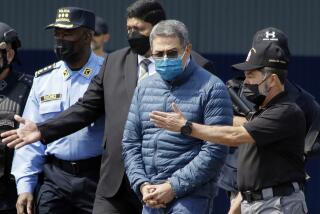Peru Guerrilla Chieftain Gets Life Term in Prison
- Share via
LIMA, Peru — After a secret trial of eight days, an anonymous military judge sentenced Sendero Luminoso guerrilla chieftain Abimael Guzman to life in prison on Wednesday and levied a $25-billion fine against him and two of his lieutenants.
The judge convicted Guzman, 57, of “treason against the fatherland,” giving him the maximum sentence allowed by Peruvian law. Anti-terrorist police captured Guzman on Sept. 12 in a Lima hide-out, ending a 12-year manhunt.
Alfredo Crespo, Guzman’s lawyer, said he will appeal the decision, handed down by a “faceless” navy judge whose identity is being kept secret for security reasons.
Guzman has the right to two appeals, the first before a “council of war” made up of members of the army, navy, air force and police. The council’s decision must be issued within 48 hours of Wednesday afternoon’s sentence.
The final appeal permitted is to the Supreme Council of Military Justice, which will have three working days to rule. If the sentence is upheld in both instances, Guzman will spend a mandatory life term at a navy base on the island of San Lorenzo, off Lima, according to his sentence.
The island was the venue for the trial of Guzman and two other Sendero Luminoso (Shining Path) leaders, who also received life sentences Wednesday. The public and press were barred from the proceedings.
Sentenced along with Guzman were: Elena Iparraguirre, his companion and Sendero’s second-in-command; and Walter Vargas, a member of the organization’s central committee. Both were arrested with Guzman.
Eight other Sendero members--four women and four men--also received life sentences Wednesday from military courts in the cities of Arequipa and Puno. Like Guzman, the eight were convicted of treason, but their fines were smaller: a total of $40 million.
The outcome of Guzman’s trial was no surprise. President Alberto Fujimori, who has governed by decree since April 5, had said repeatedly that Guzman would get a life term. After shutting down Congress in a military-backed “self-coup,” Fujimori decreed several anti-terrorism laws. They mandated life sentences for terrorist leaders, accelerated trials and created anonymous courts to protect judges. One decree declared acts of terrorism to be treason, putting them under the jurisdiction of military courts.
Some human rights groups have objected to procedures in Guzman’s case, contending that due process was violated. But a Western diplomat commented Wednesday: “Nobody other than the Sendero doubts that justice is being done in this particular case.”
Guzman’s Maoist insurgency declared war against the government in 1980. Since then, more than 25,000 Peruvians have died in political warfare and terrorism that has cost the country an estimated $22 billion in damages.
Sendero death squads have killed 40 people since Guzman’s arrest, including shantytown community leaders in Lima and an Italian priest near the highland city of Huaraz, a Sendero stronghold.
Wednesday morning, terrorists shot and killed an air force captain, two air force noncommissioned officers, a civilian chauffeur and a policeman at an outdoor market in Lima. And a bomb in a downtown square injured a pedestrian.
Earlier in the morning, security forces swept through Lima shantytowns, detaining 70 people without identity documents. The impoverished slums are known to harbor Sendero sympathizers, authorities say. Similar roundups have been carried out periodically for the past several years.
Times special correspondent Von Hagen reported from Lima. Staff writer Long reported from Santiago, Chile.
More to Read
Sign up for Essential California
The most important California stories and recommendations in your inbox every morning.
You may occasionally receive promotional content from the Los Angeles Times.













